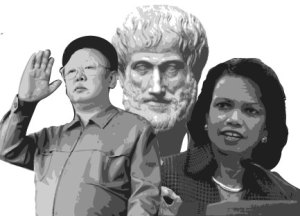Deliberating or quarrelling? Final draft of my thesis. November 7, 2010
Posted by Sverre in : Methods in political science, My master thesis, Political Theory , comments closedAfter a long and arduous process, the work on my master’s thesis is finally nearing the end. Here is a slightly adapted version of the introduction, and a link to the print ready version (PDF).
Some of the inspiration for my thesis comes from an article in the student newspaper in Trondheim, Under Dusken, and similar comments over the following years. Political science professor Anders Todal Jenssen insisted that the student democracy in Trondheim lacked legitimacy because of the low voter turnout and that the introduction of political parties would be the solution to this problem. Binding platforms would make student politicians accountable to the voters and increase support for democracy. As a student representative myself at the time, I was provoked. We were proud of the lack of polarization within the student democracy and, although I didn’t know the term at the time, the level of deliberation. This started me on the quest for an alternative to Professor Todal Jenssen’s strong belief in the salience of political parties.
Democracy does of course seem unthinkable without political parties. Almost every democracy is dominated by a system of organized factions that structure, educate and drive the political process forwards. The necessity for such a system is no longer seriously questioned in political science. I do not believe, however, that any institution should be beyond question. Even if we have no intention to get rid of political parties, we should strive to understand the effect they have on democracy. As I will show in this thesis, one such effect may be reducing open and free deliberation among decision-makers. This may be a cost we are willing to pay, but not a cost we should pay without knowing its size. (more…)
Presidents and constitutions in Latin America July 10, 2009
Posted by Sverre in : Political Theory, World politics , comments closedNow that more information is available, it seems clear that calling the situation in Honduras a coup. Using the military to drive the president out and sending him into exile is hardly part of a legitimate judicial process. Steven Taylor had some good comments about that today. For that matter i recommend all his comments on the situation in Honduras.
Even though the rest of the government obviously overstepped their bounds in ousting Zelaya in the manner they did, it still remains that the entire government wanted him gone, including his own party. Now, I don’t know much about politics in Honduras, but it all reeks of something. And looking at Latin American politics from the side, it does seem to reek of the same thing that has happened in several other countries in the region lately: That the executive branch gets in a position to keep changing the constitution and election laws to counteract the checks and balances of government, such as term limits. (more…)
Fishkin vs. Hibbing – do people really want to decide? December 4, 2008
Posted by Sverre in : My master thesis, Political behavior, Political Theory , comments closedThe following is part of the ongoing research for my master (graduate) thesis.
“Society is like a ship, and everyone must be prepared to take the helm.”
(Henrik Ibsen, An enemy of the people,my translation.)
Those of us who hold deliberation (in any form) to be an important prerequisite for informed decision making, would also be interested in the topic of how deliberative functions in society can be improved.
James Fishkin has been one of the most quoted political scientists concerned with the topic of deliberation. He’s a normative scientist, concerned with the benefits that can be reaped from encouraging more democratic debate throughout the population. He has proposed new democratic institutions, such as deliberative opinion polls, or more grandly the thought of a universal “Deliberation Day” (Ackerman & Fishkin 2003). But both of these rest on one very important assumption, that “[…]most citizens would be glad of the opportunity to play a serious role in important historical events” (Fishkin 1991:9). And this is an assumption Fishkin seems to take lightly. But is it realistic? (more…)
California: Tocqueville’s nightmare come true November 19, 2008
Posted by Sverre in : Political Theory, World politics , comments closedI n the euphoria surrounding the presidential election, other events in American politics have been crowded out in media. A darker chapter in American history was written in the presumably liberal state of California. I haven’t heard many (at least outside the US) discuss this, except a few bloggers – among them the authors of one of my favourite blogs, Voting While Intoxicated.
n the euphoria surrounding the presidential election, other events in American politics have been crowded out in media. A darker chapter in American history was written in the presumably liberal state of California. I haven’t heard many (at least outside the US) discuss this, except a few bloggers – among them the authors of one of my favourite blogs, Voting While Intoxicated.
I’m of course talking about the amendment to the Californian constitution to ban gay marriage, which was voted for together with the presidential election. For those who might not be familiar with the American political system, this is quite common – to include propositions to be voted on by the public together with any election. The infamous Proposition 8, named after its number on the ballot, got 52.1 percent of the vote, more than the necessary simple majority for a new state constitution amendment. It reads as follows:
SEC. 7.5. Only marriage between a man and a woman is valid or recognized in California.
As a strong supporter of gay rights, this has ruined some of my new found belief in America. But aside from my personal feelings, this is the kind of thing that would make influential political philosopher Alexis de Tocqueville turn in his grave. (more…)
“A new political culture” – the solution to old problems? August 21, 2008
Posted by Sverre in : Norwegian politics, Political Theory , comments closedPresident of the Norwegian Parliament (Stortinget), Thorbjørn Jagland, this week called for a “New political culture” in Norway in a feature article in the newspaper Aftenposten. He claims that the combination of media, opinion polls and opportunist politicians have displaced the political virtues of long term and larger view thinking. In his words political leaders have been made into characters in a play organized by media and opinion polls. Political leaders no longer show the leadership necessary to enforce policies that are too complex to be explained simply to the public.
His answer to these problems:
Vi trenger en annen politisk kultur enn den mediene og mange andre har forsøkt å oppdra oss til i sommer. Vi trenger en styringsdyktig politisk kultur i stedet for en galluppreget politisk elite. Vi trenger politikere som også er i stand til å se inn i fremtiden og føre an. Hvis ikke kan en stadig økende kravmentalitet ødelegge for oss alle.
My translation:
We need a different political culture than the one the media and many others have tried to educate us about this summer. We need a political culture for leadership rather than a political elite dominated by opinion polls. We need politicians that are able to look into the future and take the lead. If not, an ever increasing mentality of demands will ruin things for us all.
This isn’t a particularly novel point. Edmund Burke warned his constituency in Bristol about leaders who were nothing but slaves to public opinion all the way back in 1774. And in 1784, James Madison stated that:
Enlightened statesmen will not always be at the helm. Nor, in many cases, can such an adjustment be made at all without taking into view indirect and remote considerations, which will rarely prevail over the immediate interest which one party may find in disregarding the rights of another or the good of the whole.
It may be an old issue, but it’s an important one, and one that has become very visible in Norway over the last months. A series of cabinet ministers have come and gone – not because of their policies but because of media campaigns where they have been tricked into making blunders. Over the last few years, we have also seen the populist radical right grow bolder and more confident, gradually boosting the close combat fight over next week’s opinion polls. (more…)
Socrates on North Korea – the play. July 29, 2008
Posted by Sverre in : Political Theory , comments closedThe first proper blog post is a piece that was written for a graduate class in democracy theory. The class was divided into two teams that were asked to defend or oppose a given statement. In the debate in question, my team’s assignment was to defend the North Korean state calling itself the “Democratic People’s Republic of Korea”. As points were awarded by our professor for creativity, I decided to be a bit original and write an opening argument as a play based on Plato’s The Republic.
Defending North Korea as a democracy is of course ludicrous for any informed westerner. In fact I want to make it expressly clear to anyone that doesn’t see the irony that I do in no way whatsoever endorse what I consider the dictatorial and inhumane state of North Korea.
With this in mind we had to resort to rhetorical tricks and clouding the subject for any chance to win the debate on more technical terms. My tactic was therefore to start attacking the arguments I presumed the opposition would be making in an unexpected way, trying to discredit their sources.
The paper is loosely based on Plato’s style of writing, with the introduction slightly altered from the introduction of Plato’s The Republic. In this piece, Socrates – usually the main character in Plato’s dialogues – debates with a number of opponents on the subject of North Korea – among them John Stuart Mill, Montesquieu, Alexander Hamilton and Condoleezza Rice. (more…)